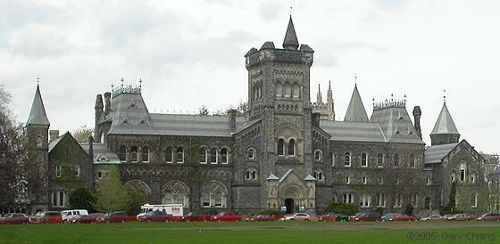Heritage Language: Russian
Heritage Language Resources at the University of Toronto Libraries
The University of Toronto Libraries have an abundance of resources for both speakers of heritage languages and those interested in learning about these languages, including Russian.
Libraries at the University of Toronto hold 180,849 publications in Russian, over 4,000 of which are about the language itself. These include materials on all aspects of the language: grammar, morphemics and word formation, morphology, syntax and punctuation, vocabulary, synonyms and antonyms, style and phraseology, phonetics and phonology, linguistics and many other topics. Textbooks for learners of Russian as a native language or second-language learners who have reached a level high enough to use textbooks written in the language are present as well.

University of Toronto Front Campus
For speakers of the language who are interested in reading other materials in Russian, works of literature and books about almost any subject, including history,geography, politics, science, culture and art are all available. All of these and a multitude of other resources, including periodicals and audio recordings, can be found at the libraries at the University of Toronto. Therefore, here, at one of the leading research library systems in North America, every speaker of Russian can find something that suits his/her interests. Whether one is a student searching for materials on Russian language and linguistics, or any other field, such as sciences, humanities, etc., a community member looking for classic Russian literature to read, an educator requiring aids in teaching the language to native, heritage or second language learners, or any other person, one will always be able to discover a lot using the collection of the University of Toronto Libraries.
Thomas Fisher Rare Book Library
Native and heritage speakers of Russian (with advanced reading abilities) and advanced second language learners can head to the Thomas Fisher Rare Book Library to read some historical artifacts, such as the weekly newspaper “The Week” from the Russian Empire. A collection of these newspapers from the second half of 1897 is available at the library. In addition to reading about the news of the time period from the perspective of a contemporary of that period, readers will be able to experience the language of that time. It is not much different from contemporary Russian language, which makes the newspaper relatively easy to read. However, there are aspects that have changed since then: ‘ъ’ is no longer written at the end of every word that ends with a consonant, Genitive singular endings for adjectives and participles are now -ого/-его, not -аго/-яго, two letters, ‘Ѣ’ and ‘i’, that expressed the same sounds as letters ‘е’ and ‘и’ respectively, have disappeared, and hyphens are no longer written as often as they used to be. Language and history enthusiasts would be able to see that for themselves when they read the newspapers.

Emmanuel College Library at Victoria University
Robarts Library
Robarts, the largest library at UofT, contains 58,623 publications written in Russian. These publications come in all kinds of formats: books, videos/DVDs, motion picture films, music scores, audio, journals, magazines, newspapers, cartographic materials, manuscripts, and computer programs. With these resources, speakers of the Russian language can easily read or listen to or view many different types of material in their preferred language.
Online Resources
You can find all this information and more at http://search.library.utoronto.ca/. Simply type what you’re looking for into the advanced search engine, and you will be able to find exactly what you’re looking for. You can even add more filters to help you narrow down your search more.
In short, the University of Toronto Libraries is a great place to explore Russian language and its use in other fields, as well as its historical development. A multitude of resources is available for everyone – native, heritage and second language speakers of Russian, as well as those who do not speak Russian, but are interested in this language or heritage languages in general.
Authors: Jerry Dyakov and Valeriya Mordvinova.